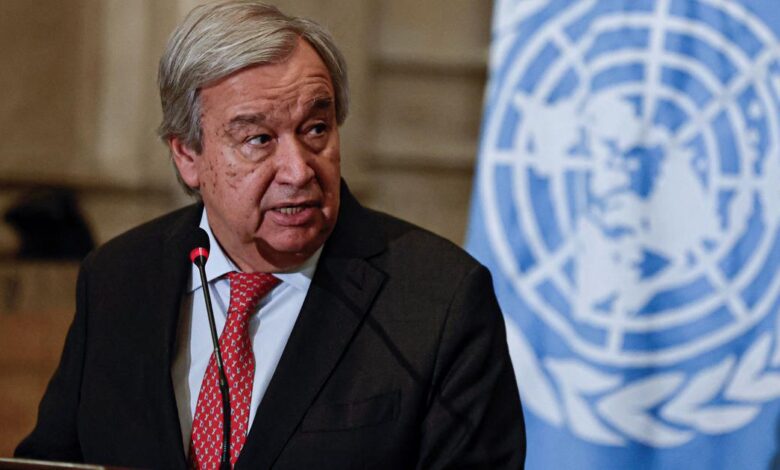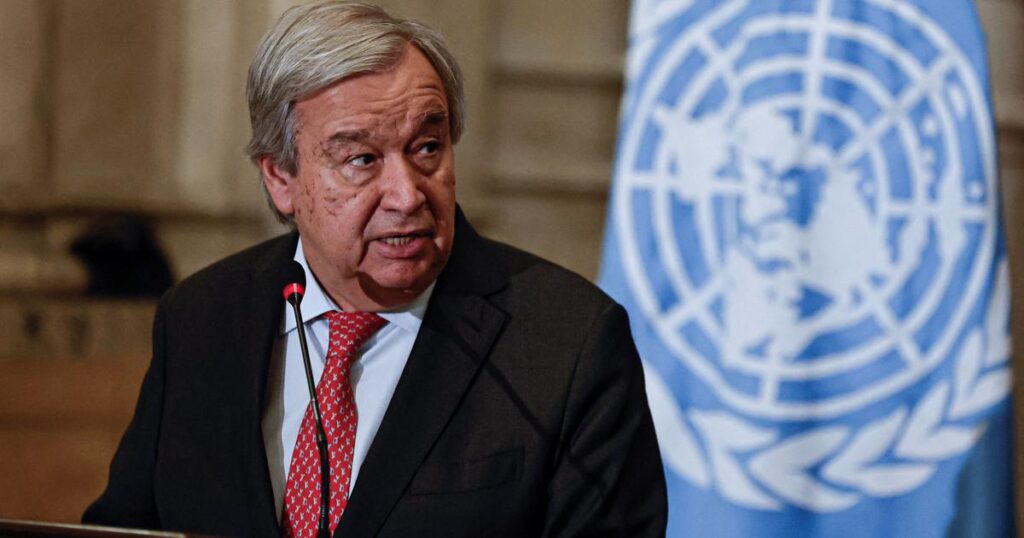Israel Bans UN Secretary-General Antonio Guterres Amid Rising Tensions

Israel’s Bold Move: Banning a Global Leader
In a dramatic turn of events, Israel has imposed a sudden and unprecedented ban on United Nations Secretary-General Antonio Guterres, threatening his immediate detention if he steps foot on Israeli soil. This strong action has raised eyebrows worldwide, marking Israel as the first nation to declare the head of the UN as “persona non grata.”
A First in History: Israel’s Defiant Stand
It is rare to see a country, especially one as small as Israel, take such a firm stance against the global leadership of the United Nations. Historically, the UN has been a platform for diplomacy, but Israel’s bold defiance against its Secretary-General is unprecedented. Despite having a population of less than 10 million, Israel has demonstrated its global dominance, openly challenging the authority of the UN.

Why the Ban on Guterres? The Root of the Conflict
The conflict escalated when Antonio Guterres made statements regarding the widening conflict in the Middle East, particularly in the wake of Iran’s missile attacks on Israel. His comments, which appeared to generalize the situation as part of a broader Middle Eastern conflict, deeply angered Israel. Instead of condemning Iran’s direct missile strikes on Israeli civilians, Guterres opted for a broader condemnation of the escalating violence in the region, a stance that many in Israel found insufficient.
Iran’s Role and Israel’s Response
Late one night, over 200 missiles were fired by Iran toward Israel. Fortunately, no Israeli citizens were killed, but the attack fueled outrage. Israel expected a strong condemnation from Guterres, specifically against Iran’s actions. However, his statement focused on the “escalation of the Middle East conflict,” leading Israeli officials to accuse Guterres of downplaying the gravity of the missile attack and failing to stand against Iran’s aggression.
Israel’s Foreign Minister Takes Action
Israel’s Foreign Minister, Israel Katz, voiced the government’s frustration, announcing that Guterres had been officially banned from entering the country. Katz pointed out that Guterres had yet to condemn the terrorist attacks that occurred on October 7, during which more than 1,200 Israeli civilians were killed by Hamas. This delay in condemnation, coupled with the fact that the UN has not designated Hamas as a terrorist organization, further strained relations between Israel and the UN.
Why Foreign Investors Are Flocking to India’s Market Amid Global Withdrawals
Global Reactions and Criticism of Guterres
International reactions have been mixed. Some analysts argue that Guterres’ comments were meant to promote peace and prevent further escalation. However, many Israeli supporters have accused him of consistently siding with terrorists, highlighting a series of controversial remarks made by Guterres in the past.
Pro-Israel factions have voiced their concerns publicly, stating that Guterres has failed to recognize the severity of terrorist actions against Israel. Even the official social media accounts of Israel’s government have expressed disappointment, calling Guterres “blind, deaf, and useless,” and urging him to adopt a more just stance toward Israel’s security concerns.
Iran’s Threats: An Escalating Situation
Adding fuel to the fire, Iran’s Ministry of Intelligence has recently published concerning threats, indicating their intent to target Israeli military leaders, from the Israeli Defense Minister to Prime Minister Benjamin Netanyahu. This development has further complicated the situation, as Iran’s hostile rhetoric toward Israel continues to escalate.
India’s Support for Israel
While the UN appears hesitant to take a firm stand against Iran, India has openly supported Israel. Indian External Affairs Minister S. Jaishankar recently stated that India understands Israel’s need to respond to the October 7 attacks, further solidifying the strong diplomatic ties between the two nations. India, like many other countries, condemns the loss of civilian lives in Gaza but recognizes Israel’s right to defend itself against terrorist threats.
What’s Next for Israel and the UN?
As Israel stands firm in its decision to ban Guterres, many are left wondering what this will mean for the future of international diplomacy. The United Nations is often seen as the last bastion of neutrality and dialogue, but Israel’s move to ban its leader could signal a shift in how smaller nations interact with global organizations.
The situation also raises larger questions about the role of the UN in conflict resolution and its ability to effectively mediate in deeply complex, volatile situations like the ongoing Israeli-Iranian tensions.
Conclusion
The world is watching closely as Israel navigates these difficult waters. The boldness of its actions, from missile defense to banning global leaders, has positioned it as a nation that won’t hesitate to defend its interests, even in the face of global institutions like the United Nations.






One Comment